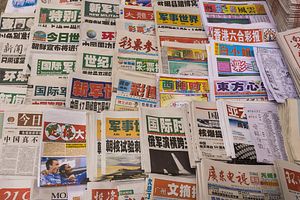On Friday, Chinese President Xi Jinping visited the headquarters of China’s top state-run news outlets, the People’s Daily newspaper, Xinhua News Agency, and China Central Television (CCTV). Afterwards, Xi took advantage of the opportunity to underscore the proper role of journalists: that is, functioning as mouthpieces for the Chinese Communist Party.
Speaking at a symposium on Friday, Xi reminded listeners that government-run media outlets are the “publicity fronts” for the CCP and the government. “All news media run by the Party must work to speak for the Party’s will and its propositions and protect the Party’s authority and unity,” Xinhua paraphrased Xi as saying.
Xi’s comments extended beyond Party-owned news outlets, however, to include all journalists. He called for the promotion of “Marxist journalistic education,” saying that journalists must be “disseminators of the Party’s policies and propositions.” Under Xi, China has ramped up ideological training of its journalists, requiring them to take an exam proving their Marxist bona fides in order to become certified (questions include: “What is the essence of ‘Socialism with Chinese Characteristics’?” and “What is the most important difference between our news ethics and that of Western developed countries?”).
Xi’s vision of journalism acknowledges the role of the media in revealing social problems, but he maintained that “public supervision and positive publicity are two compatible functions of media.” His emphasis has been strongly on the latter, with repeated urgings for Chinese journalists and public citizens alike to spread “positive energy.” Journalists that exercise a ‘supervisory’ role — for example, by reporting on corruption — are susceptible to being thrown in prison for “spreading falsehoods.”
The emphasis on Party control over Chinese media is not new. The now infamous Document 9 decried attempts to “promote the West’s idea of journalism and undermine our country’s principle that the media should be infused with the spirit of the Party.” That communique, circulated within the CCP’s General Office in April 2013, describes seven “false ideological trends, positions, and activities” the Party must guard against, including constitutional democracy and universal values as well as Western journalistic ideals. Advocates of the free press, the document concluded, are attempting to “gouge an opening through which to infiltrate our ideology.” As protection against those attempts, the document prescribed “unwavering adherence to the principle of the Party’s control of media” – which also served as the theme of Xi’s speech on Friday.
Document 9 made it clear that the Party sees a free press as an existential threat, and thus seeks media control at all costs. As a sign of how seriously China takes its control over the media sphere, the Ministry of Industry and Information Technology recently released new rules that decree “Sino-foreign joint ventures, Sino-foreign cooperative ventures, and foreign business units shall not engage in online publishing services.” And those “online publishing services” are defined broadly, as “texts, pictures, maps, games, animations, audios, and videos.” As Quartz notes, the “new rules… could, if they were enforced as written, essentially shut down China as a market for foreign news outlets, publishers, gaming companies, information providers, and entertainment companies starting on March 10.”
The new rules are just the most startling example of a long list of moves China has taken to curtail foreign reporting, from banning the websites of international news outlets like the New York Times and Reuters to expelling foreign reporters Melissa Chan, Austin Ramzy, Paul Mooney, and Ursula Gauthier.
The rules also provided a list of offenses that Chinese media companies are expected to avoid, all of them incredibly vague and subject to the Party’s interpretation (from “harming national honor” to “endangering social morality”).
Taken together, China’s tight control over its domestic media and blockage of foreign reporting have left little room for independent journalism in China. Reporters Without Borders’ 2015 World Press Freedom Index ranked China 176th out of 180 counties in the ranking. And while China has consistently ranked in the bottom six countries on the Index for over a decade, things seem to be getting worse.
The International Federation of Journalists spokes of increased government control over the media sphere in its 2015 China Press Freedom Report. “Propaganda, censorship, surveillance, intimidation, detention, brutality and attacks, and televised ‘confessions’ have become go-to tools for the government as they tighten their grip on the media and the press in 2015,” IFJ noted.
Xi’s speech indicates that these trends are not likely to reverse anytime soon. For the CCP, control over the media is simply too important to its continued rule. As Xi put it, managing the media is “crucial” for “the future and fate of the Party and the country.”

































